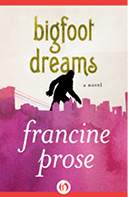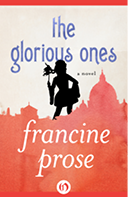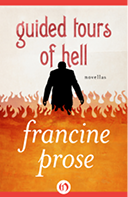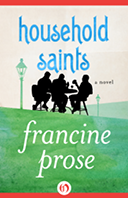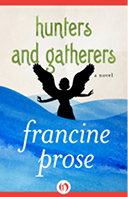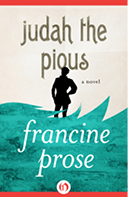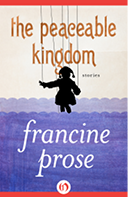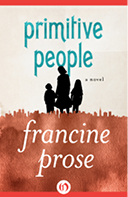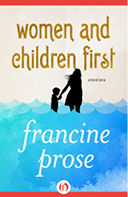Women and Children First (24 page)

“Not any
day
now,” says Mrs. Flexner, and knocks on the wooden table.
“Art’s not a bad investment,” Becky says.
“Bullshit,” says Lou Flexner. “It’s a bullshit investment. I’d only buy the stuff if I liked it. You think I’d like it?”
“Sure,” says Becky, though it’s hard to say what Lou Flexner would make of Rainer’s pachinko machines. Liking wouldn’t even come into it. “Sure,” she repeats, this time with more conviction.
“Maybe I should come down and take a look at it,” Lou Flexner says. “Have you got a card?”
“Her and her
husband
’s card,” says Mrs. Flexner, stopping Becky, who’s reaching into her purse. She does have a card, with her name and Jack’s. How would she explain that?
“No,” she says. “Sorry.”
There’s a silence. Then Mrs. Flexner says, “You know whose work I especially like?”
“Whose?” asks Becky, checking the walls for a clue.
“Bonnard’s,” Mrs. Flexner says.
“His paintings are so
lovely
,” Becky says. She knows it’s not the most original thing that’s ever been said about Bonnard, whose paintings Becky really does like. But what seems important right now is to show some solidarity with Mrs. Flexner.
Mr. Flexner says, “Irene, where did you get the roast?”
“White Plains, I think,” she says. “Why?”
“Stringy,” her husband says.
“Gail’s eating it,” Mrs. Flexner says.
Becky looks down at her plate; it’s half empty. Gail
could
have eaten it for all the pleasure or nourishment Becky’s gotten. Mrs. Flexner says, “I’ll tell you something about Bonnard. Something you probably don’t know. When his wife died, after forty-six years of marriage, the man just went to pieces! He never painted another nude, never painted much of anything. Four years later he died of a broken heart.”
“Irene,” says Mr. Flexner. “Stop it.”
“That’s the difference between Bonnard and the men of today,” Mrs. Flexner says. “An artist like that, he knew love, he knew beauty. All today’s men know is running around with their thirty-year-old secretaries.”
It’s clear that Mrs. Flexner isn’t speaking abstractly. Oh, Becky thinks. Poor Irene. Though running around with a thirty-year-old secretary is better than what Becky might have imagined from Mrs. Flexner’s note, it’s bad enough. Mrs. Flexner turns to Becky, asking, “Don’t you think thirty’s a little young for a man my husband’s age?”
It occurs to Becky that Mrs. Flexner probably thinks
she
is thirty, and wants her, by agreeing, to suggest that Flexner is too old for
her
. Becky is reluctant to hurt Flexner; at the same time she can’t help thinking that thirty
does
seem young—especially compared to her age, thirty-nine.
“This isn’t the time to talk about this,” Flexner says.
“When is the time?” asks Irene. “For three days it hasn’t been time to talk about you spending the second seder night with her. What did her family think? That you weren’t sixty-three and married?” Irene puts her hands over her face and starts to cry. Becky and Flexner look at each other. Suddenly everything is reversed: now they are the parents and Irene the difficult child with whom they must somehow cope. Becky so wants to comfort Irene she has to fight the desire to say: Hey it happens to everyone. My husband left me for a woman named Darlene.
Irene goes into the kitchen, sobbing louder and more harshly the farther away she gets. Even her tears are like a child’s—meant for the grown-ups to hear. There are a million questions Becky wants to ask and doesn’t, nor does she do what she should do—leave. Instead she sits at the table and stares at Lou. She thinks: Time has stopped, but not at a moment either of them would have chosen. Lou looks slightly past Becky, his face so expressionless she could have caught him deep in thought or glancing in the mirror. Free to examine his face, Becky understands what a thirty-year-old might see there. He can take care of things. He can decide. He and Irene have two daughters and a son.
Strangely, Becky is thinking about the books. Did Irene really have any for her? Is it too late to ask Lou? How nice it would be to have something to take back to Gail’s—to sit on the garage floor and let the musty smell of old books intoxicate her, put her into a kind of stupor from which it would be difficult to get up. It’s how she used to feel, on hot summer days, sitting on the floor of her mother’s attic, looking through boxes of family photos, shuffling those cracked, brown prints of forgotten relatives, courting couples, newlyweds, new babies. Probably those cartons are in Gail’s garage. Becky hates it that Gail has inherited them by default. But her loft never seemed safe, permanent enough to house something so irreplaceable. How could she and Jack have had a child if they couldn’t even do that?
From the other room, Irene’s cries grow more strident and less human. They sound like those distant, oddly aquatic roars that echo from time to time through the zoo, or, Becky realizes with surprise, like
I Love Lucy
’s panicky cry of anxiety and fright. She remembers the last time she heard Lucille Ball make that uncontrolled, rhythmic, animal sound. She even remembers the episode, the one in which Lucy gets a job packing chocolates in a candy factory and the assembly line begins spitting chocolates at her, faster and faster and faster. Becky knows just where she saw it—she can picture herself and Gail lying on their stomachs, their faces cupped in their hands, inches away from the TV screen at the foot of their parents’ bed.
The memory is so vivid it summons up much that has happened since, as well as much that should have happened and didn’t. And suddenly it’s as if all those past and unrealized events are swirling around her, and Becky feels as if she and Lou Flexner are the couple in an insurance commercial she’s seen: that cartoon man and woman standing rigid while houses, cars, children, appliances, pets—while all the things there are to lose go on falling behind them like rain.
Francine Prose is the author of sixteen novels, including
A Changed Man
, winner of the Dayton Literary Peace Prize, and
Blue Angel
, a finalist for the National Book Award. Her most recent works of nonfiction include the highly acclaimed
Anne Frank: The Book, the Life, the Afterlife
, and the
New York Times
bestseller
Reading Like a Writer
. A former president of PEN American Center and a member of the American Academy of Arts and Letters, as well as the American Academy of Arts and Sciences, Prose is a highly regarded critic and essayist, and has taught literature and writing for more than twenty years at major universities. She is a distinguished writer in residence at Bard College, and she lives in New York City.
All rights reserved, including without limitation the right to reproduce this ebook or any portion thereof in any form or by any means, whether electronic or mechanical, now known or hereinafter invented, without the express written permission of the publisher.
This is a work of fiction. Names, characters, places, events, and incidents either are the product of the author’s imagination or are used fictitiously. Any resemblance to actual persons, living or dead, businesses, companies, events, or locales is entirely coincidental.
Some of these stories first appeared, in somewhat different form, in
The New Yorker
,
Antaeus, The Atlantic, Pushcart Prize XI, Commentary,
and
Ploughshares
.
Copyright © 1974, 1983, 1985, 1986, 1988 by Francine Prose
Cover design by Jason Gabbert
978-1-4804-4507-9
This edition published in 2013 by Open Road Integrated Media, Inc.
345 Hudson Street
New York, NY 10014

